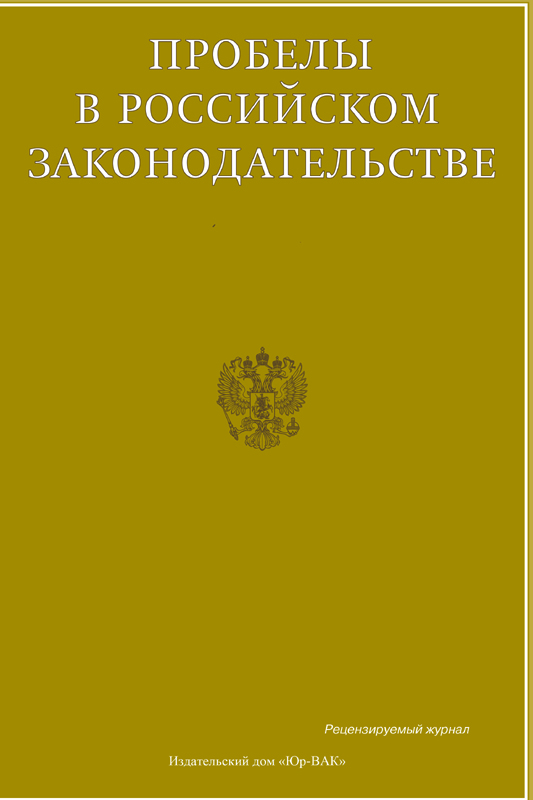Establishing the Percentage Compensation of the Insolvency Receiver in Satisfying the Claims of Subordinated Creditors
- Авторлар: Voronov F.A.1, Kopchenov Y.A.2
-
Мекемелер:
- Kutafin Moscow State Law University (MSAL)
- Institute of Legislation and Comparative Law under the Government of the Russian Federation
- Шығарылым: Том 15, № 4 (2022)
- Беттер: 317-328
- Бөлім: Articles
- URL: https://journals.eco-vector.com/2072-3164/article/view/531747
- ID: 531747
Дәйексөз келтіру
Аннотация
The article considers situations of potential conflict of material, personal interest of the insolvency receiver and the interests of other participants of the bankruptcy case in relation to the establishment of compensation of the insolvency receiver for the repayment of claims, which are taken into account in the order preceding the distribution of the liquidation quota. The article illustrates the imperfection of the current legal regulation in this regard. It is proposed to reform the current regulation based on the principle of reasonableness, expressed in the calculation of interest based on the amount of payments that the receiver used to repay creditors' claims, regardless of their legal status.
Толық мәтін
Авторлар туралы
Fedor Voronov
Kutafin Moscow State Law University (MSAL)
Email: voronovf@mail.ru
postgraduate student of the Business and Corporate law Department Moscow, Russia
Yuri Kopchenov
Institute of Legislation and Comparative Law under the Government of the Russian Federation
Email: kaw.arbitr@gmail.com
bankruptcy trustee, Member of the Association of Self-Regulated Organization of Arbitration Managers «Interregional Center of Experts and Professional Managers» (Association SRO «MCPU»), postgraduate student of the Department of Private Law Disciplines Moscow, Russia
Әдебиет тізімі
- Gabov A.V. Factual affiliation in insolvency (bankruptcy) court practice: causes and purposes of occurrence (grounds), examples of use // Civil Law of the Social State: Collection of Articles Dedicated to the 90th Anniversary of Prof. A.L. Makovsky's Birth (1930 - 2020)". (ed. by V.V. Vitryansky, E.A. Sukhanov ("Statute", 2020) // ‘Consultant+’.
- Drancova K.V. The legal regime of creditors' claims for current payments in insolvency (bankruptcy) proceedings.// Dis. Sankt-Petersburg 2017, https://disser.spbu.ru
- Egorov A.V. Impact of affiliation on bankruptcy. // Civilistika, 2021, № 2. p. 20-67
- Zaloilo M.V., Vlasenko N.A., SHubert T.E. Chapter 4. The concept, forms and content of court practice// Judicial Practice in Russia's Modern Legal System: Monograph / T.Y. Khabrieva, V.V. Lazarev, A.V. Gabov et al. ed. by T.Y. Khabrieva, V.V. Lazarev. Moscow: IZiSP, NORMA, INFRA-M, 2017. 432 p. // 'Consultant+'.
- Karapetov A.G. Main Provisions of Civil Law. Article-by-article commentary to Articles 1-16.1 of the Civil Code of the Russian Federation // M-Logos, 2020. p. 464-471.
- Kravchenko A.A. Paragraph 1: Towards ensuring the implementation of the principle of good faith in the activity of an insolvency receiver // Institute of insolvency (bankruptcy) in the legal system of Russia and foreign countries: theory and law enforcement practice: monograph / A.B. Baranova, A.Z. Bobyleva, V.A. Vaypan et al; ed. by S.A. Karelina, I.V. Frolov. Moscow: Justycinform, 2020. p. 360. // 'Consultant+'.
- Kravchenko A.A. Mechanism to ensure good faith behaviour of insolvency (bankruptcy) entities // Law and business. 2021 g. № 2. p. 32 - 47.
- Kravchenko A.A. Implementing the principle of good faith in insolvency (bankruptcy): legal issues. // Dis. M. 2020, https://istina.msu.ru
- Konovalov A.V. The principle of reasonableness in civil law // "Current Problems of Russian Law", 2019, No. 8 // Consultant+
- Mikryukov V.A. Intensification of the application of the analogy of law in the practice of overcoming civil law uncertainty // Current Problems of Russian Law, 2021, No. 8 //‘Consultant+’
- Shishmareva T.P. [Ways to counteract abuse of rights by participants in insolvency (bankruptcy) proceedings// Laws of Russia: Experience, Analysis, Practice, 2021, No. 2 // ‘Consultant+’.
Қосымша файлдар








